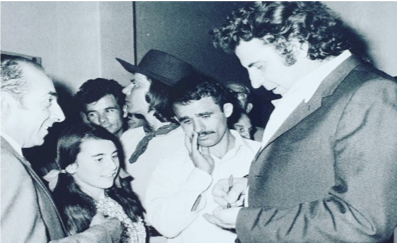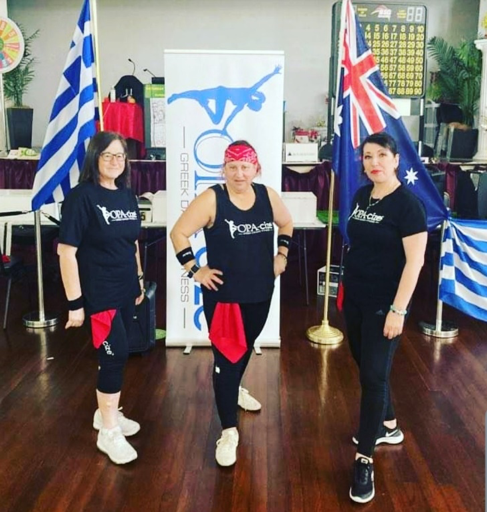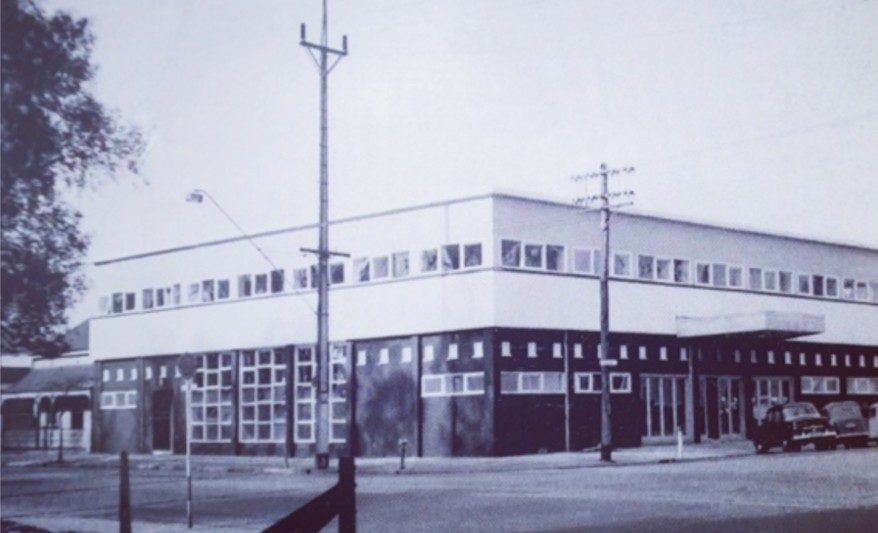By Doris Falidis Nickolas
She sits proudly, entangled in a plethora of sentimental memories, not much different to when she was first built back in 1957. Nonetheless she serves a slightly different purpose these days.
Built in 1957, for three gratifying decades she was the symbolic home for the extensive community of the newly arrived Greeks of the Diaspora. As the young migrants settled into their new lives in the humble city of Adelaide, the unfamiliarity of what was now home, was overwhelming. Life in the patritha would soon become an engravement only in thought.
No longer to be heard, the ring of the village church bell. The pleasurable chatter of the neighbourhood outside their homes, faded. The cheers from the children playing in the platia asthe elders of the village sat around the local cafeniou sipping a tsipouro, gone. Even the constant and soothing sounds of the traditional beads, the komboloi, would be sorely missed.
Yes, their new homes were larger … yes – the streets were wide and clean … nevertheless, life would not measure up to what was once accustomed by these young migrants.
Eager to continue the strong traditions left behind in their beloved homeland and to create a platform where they could come together, the young and enthusiastic Greeks of the small Adelaide community formed strong bonds, creating what would become the most treasured memories for each and every one of them.
With passionate drive, determination and hard work, the new migrants to Adelaide invested an enormous amount of their time in this iconic hall, creating a wonderful place to call home.
Today, the most sentimental memories of a bygone era remain within the walls of this building. If only she could speak, she would shower us with the most beautiful and loving stories. She would replay the familiar tunes of the bouzouki, the idol of Greek music, over again, taking us back to an exceptional era.

She was the Olympic Hall (now known as Hellenic House) … a meeting place where the struggles of new life for these young and apprehensive migrants could be forgotten and instead joy and hope was implemented. It was their go to, somewhere to meet fellow patriotes, new and long-lasting friendships were made, young couples met, fell in love, celebrated engagements and weddings.
Debutant balls were a major event the Greek youth looked forward to, as was the Grecian Ball. A chance to dress in their finest and perhaps even meet their future partner. Fundraisers where significant dignitaries such as Mr. Don Dunstan and Mr. Gough Whitlam were guests. The Greek people were beyond words and awe-struck when the legendary Greek composer, Mikis Theodorakis performed specially at the hall in 1972. The venue was buzzing…
As the years rolled on, she hosted countless dances, concerts, theatrical performances, educational seminars and many invaluable social services.
“Until this day, there is Greek language education offered to the children of Greek descent and Greek adult classes for Greek and non-Greek citizens,” explains Mr Bill Gonis, President of the Greek Orthodox Community. Growing up in this wonderful era, especially as teenagers meant spending many weekends at the Olympic House. Eager, most of us teenagers would plan our outfit days in advance ready for the traditional dance usually held on a Saturday evening. Along with our parents, we would meet up with family and friends and enjoy a nostalgic evening of Greek food and of course, nothing meant more than an evening arm linked to arm, dancing to the harmonious melodies of Greek music.
The famous white tablecloths adorned the long rectangular tables which sat the excited party goers. Metallic chairs doubled up as makeshift beds for the youngsters who fell asleep. Still, the adults of that era made us youngsters resilient to late nights and we coped just fine!

For many of us, the Olympic Hall was the place where we learnt our very first steps of the tsamiko and the kalamatiano! Entangled in amongst the adults, as they moved around the dance floor, we managed to keep up with the steps, eventually perfecting them.
Dancing to the traditional Greek melodies brought on the beautiful flash backs of life back home, taking uncertainties away. Being on that dancefloor, where the young handsome men proudly showed how the tsamiko was done and the pretty young women followed, for in those happy moments, all doubts and fears were replaced by laughter, love and hope.
As the years progressed the people of various regions of Greece came together, building their own Community Centres, leaving the Olympic Hall a little less occupied. However, up until earlier this year dances and events were still being held at the hall. Sadly, due to the Covid 19 pandemic and restrictions in March this year, all events ceased.
Until three passionate Greek women decided to bring back the kefi back to the iconic hall …
Through their own love of Greek music and dance, the three Greek-Australian instructors of the Sydney originated dance fitness Opa-Cize, (founded by Kathy Skettos) have started weekly morning classes at the hall, describing it as reminiscing an unique era.
Initially Sia, one of the founders of Adelaide based Opa-Cize came up with the idea of visiting the Greek nursing homes, bringing an hour of Greek music woven in with a dance fitness routine for the lovely residents.

“It was a way to give back to the Greek community,” Sia explained.
Hearing the familiar traditional music, especially the ones relating to immigration, triggered the memories of some of the dementia residents. As the instructors performed their routine, one could not help but notice the profound joy passed on to the residents.
“Their faces lit up,” Sia beams, “The residents joined in, moving, dancing, clapping their hands as the memories of their beloved tunes returned.
The three Opa-Cize instructors Sophie, Katrina along with Sia, would leave the classes with such elevated feelings, eager for the next session to commence.
Unfortunately, as a result of the Covid 19 restrictions taking place in March this year, all contact with the nursing homes ceased.
With the absence of the interaction with the Greek community, these active women got itchy feet. Determined to continue to give back to the community, they started to search for a community hall, somewhere where they could hold a class.
After a couple of setbacks, the perfect venue was found. Memories came pouring back in as the three women entered the hall, starting off a flow of intense conversation. Happy childhood memories …

“My mother did not dance much, but as children when we came to the Greek dances here, she made sure we were up dancing on that dance floor,” Sia fondly recalls. “This is where I learnt to dance,” Sia continues.
The debut came about in August, where once a week the three instructors of Opa-Cize come together at the Olympic Hall and hold an hour of dance fitness and fun to the sounds of Greek music.
“It doesn’t matter what age; we have a routine for all.” Says Katrina. “It is somewhere for the Greek women to come and enjoy socializing,” she continues.
‘‘Dance is life-saving” affirms Sophie, Opa-Cize instructor. “It is an hour of your day where you can forget everything, keep fit and have lots of fun.”
“We do this for the love of Greek music, for the fitness and to give back to the community,” Katrina adds.
“Friendship and Greek music go together wonderfully,” Sia elaborates.
The three passionate Opa-Cize instructors would love to see the Olympic Hall filled with women (and men are welcome) where the Greek essence of life continues.
(For more information on the Wednesday morning classes please call Katrina on 0401 418 070 or check out the Opa-Cize website for Australia wide classes).
There is a nostalgic feel about coming back to the Olympic Hall. It is as if you can feel the presence of all those who once filled the space. The warmth and the joy of those who created these memories will be etched into this space for a very long time.
A tribute to the brave and courageous migrants who left behind a legacy …
